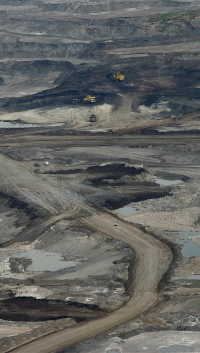Emma Gilchrist — Jun 01, 2010
Kitamaat Village, B.C. — Sometimes it takes tar balls washing up on beaches, as the people of the Gulf coast are experiencing due to the BP oil spill, before we really get the environmental risk we've allowed to threaten our land, air and water.
But that's not the case here on B.C.'s North Coast, in the heart of the Great Bear Rainforest and home to a growing opposition to the proposed Enbridge Northern Gateway oil sands pipeline.
The threat of an oil spill has united northern communities against the Enbridge project, which would open B.C.'s North Coast to crude oil tankers.
In a previous blog post, we outlined several other concerns with the Enbridge project, including the impact of pipeline construction and leaks on salmon, the violation of First Nations' rights and the fact the project will enable a 30 per cent increase in oil sands production.
These threats have now become even more real after Enbridge filed its regulatory application on May 27, just two days before a giant solidarity gathering in Kitamaat Village, the site of the proposed tanker port and home to the Haisla Nation.
While Enbridge stresses that the project will undergo a "thorough and comprehensive public review," the reality is that 99 per cent of federal environmental assessments result in project approval.
That's part of the reason why more than 1,000 people turned out for Saturday's event, which included presentations from First Nations leaders, renowned marine biologist Riki Ott and David Suzuki.
The day started with a ceremonial welcoming of Norm Hann, who paddled 385 kilometres from Kitamaat Village to Bella Bella on a stand-up paddleboard to raise awareness about the proposed Enbridge project.
Hann, a wilderness guide, represents what's really remarkable about the campaign against Enbridge: it's brought together the community in an unprecedented way. On Saturday, the event organized by the Coastal First Nations attracted supporters from far and wide, including the Wet'suwet'en, the Carrier Sekani, environmental organizations and citizens from Prince George to Prince Rupert.
It's clear that this fight will change these communities — for better or for worse. For a culture of people that refers to the ocean as its "supermarket," an oil spill would be a catastrophic end to a way of life that has endured for thousands of years.
It has happened before and, if tankers are allowed up Douglas Channel, it could happen again, said Riki Ott. In a poignant presentation, she told the audience how the people of Prince William Sound refer to the 1989 Exxon Valdez oil spill as "the day the water died" — a terrifying label for the fishermen in the audience to digest.
A marine biologist who lived in Alaska at the time of the spill, Ott described an ecosystem that has never recovered from that fateful day 21 years ago. By 1993, there was an entire ecosystem collapse and to this day 15 of 25 species studied have not fully recovered, she said. They may never recover. As for the people who depended on the ocean, their lives have changed forever — all for what?
Jobs. As is generally the case, the environment has been pitted against the economy in the battle over the Enbridge pipeline. But the project will only create between 45 and 200 full-time permanent jobs across the entire 1,200-kilometre route — compare that to the approximately 1,400 people employed by Alcan, Kitimat's largest employer. A way of life that has existed for millennia and a wild salmon economy are both being put at stake to open new markets for controversial oil sands oil, widely considered to be the highest environmental impact oil under commercial development today, and for just a few dozen local jobs.
"Anyone who tells you there will be no accidents or major spills as a result of this pipeline going through is either unbelievably stupid or deliberately lying to you," said the evening speaker, David Suzuki.
A spill is inevitable: that message was heard many times Saturday. As we've seen in the Gulf, no technology is foolproof and spills will happen —it's just a matter of when, where and how bad it will be.
While the arguments against the Enbridge pipeline are plentiful and compelling, perhaps the most compelling argument only comes into focus when you zoom out. That's the perspective Suzuki offered in the closing speech of the day.
He lamented how rapidly humans have changed from a local people to one that does not acknowledge it is part of nature.
"In my lifetime, the population has more than tripled. We are the most numerous mammal on the planet," Suzuki said. "As more people live in cities, our connection with the world that supports us becomes thinner and thinner."
Thin, but not nonexistent — especially in these parts. The First Nations peoples vow to stop the pipeline coming through their lands and to blockade tankers in their fishing boats if they have to. And if there is one thing that this weekend's event made clear it's that they don't stand alone.





Shelley — Jun 06, 2010 - 09:14 PM MT
A fascinating, sad, scary read. Thank you for writing this!
Post new comment